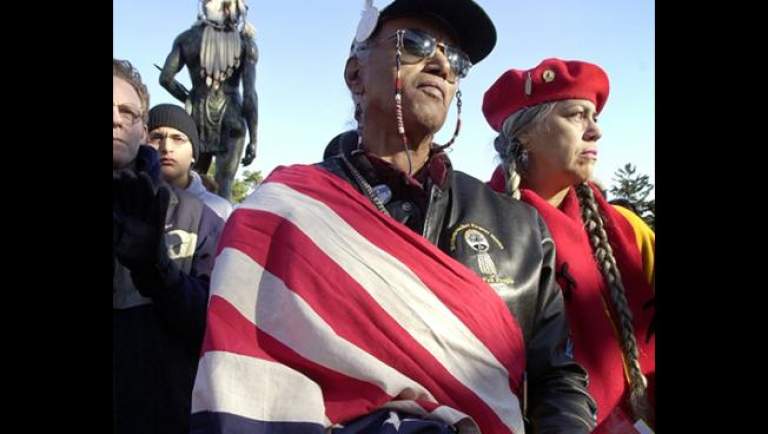
Thanksgiving Mourning commemoration at statue of Massasoit in Plymouth, Mass. (Courtesy CDN-News.WGBH.org)
Justice & Opportunity
Should We Commemorate Thanksgiving?
Published November 28, 2019
By Dee Fowler
We all think we know the story of the first Thanksgiving; how the grateful Pilgrims shared their harvest with the friendly Indians who helped them survive that first winter in the New World. In fact, a small group of undocumented asylum seekers threw a potluck to celebrate surviving their first winter and give thanks for a successful harvest. The “guests,” according to Indian Country, were alerted by celebratory gunfire and actually deployed 90 warriors on “a fact-finding mission”.
When they arrived it was explained through a translator that they were celebrating the harvest, so we decided to stay and make sure that was true, because we’d seen in the other landings—[Captain John] Smith, even the Vikings had been here—so we wanted to make sure so we decided to camp nearby for a few days. … They [the colonists] were always vulnerable to the new land, new creatures, even the trees … . In the true history of Thanksgiving, they were very vulnerable and we did protect them, not just support them, we protected them. You can see throughout their journals that they were always nervous and, unfortunately, when they were nervous they were very aggressive.
There’s been more mainstream discussion about the menu than about the treaty that the parties established seven months earlier. The Pilgrims and Wampanoag Nation pledged a non-aggression pact and established a trade relationship that would last fifty years. The Pilgrims didn’t consider themselves empowered to negotiate in the name of the King of England, so the Wampanoags didn’t enjoy as much protection as they otherwise might have.
The indigenous people had established a stable community. True, their numbers had been decimated by diseases imported by earlier English arrivals. The initial, mutually beneficial relationship deteriorated within two generations. The ensuing story is a cautionary tale of imperialism and colonization; followed by cultural, economic and environmental devastation.
Today, non-indegenous communities generally either ignore Thanksgiving’s fraught history or walk a tightrope between apologizing our way through the shopping and feasting and a nagging feeling that we perhaps shouldn’t even celebrate at all.
Just as each Native community suffered colonization differently, there is no unitary Native American position on the Thanksgiving holiday. Wamsutta (Frank B.) James, a descendant of the parties to that broken treaty, wrote Thanksgiving Mourning in opposition to the holiday. He sees Thanksgiving a “time of reflection” in which two disparate peoples see things from two distinct perspectives. He mourns the Native lives lost to violence and slavery while struggling to overcome circumstances that make him “a product of poverty and discrimination from these two social and economic diseases.”
Jacqueline Keeler follows her Dineh mother’s example as she reclaims the holiday. At age six, Keeler’s mom taught her children not to sing “Land of the Pilgrim's pride” in “America the Beautiful”. … “‘Our people,’ she said, had been here much longer and taken much better care of the land. We were to sing ‘Land of the Indian's pride’ instead.”
That pride is nurtured in part by practices that are now considered eco-friendly and sustainable. “Since that initial sharing,” Keeler explained, “Native American food has spread around the world. Nearly 70 percent of all crops grown today were originally cultivated by Native American peoples.”
The First Nations contributed to the cultural, economic, judicial, and scientific life of this continent. We, the non-Native peoples, often unknowingly follow their example or appropriate their contributions in an effort to improve our lives. As our environment becomes more toxic and the planet warms, leading scientists advise us to shrink the footprint we’re leaving on this land. We will all benefit if we affirm to be more mindful of what we do and respectful toward those to whom we owe so much.
Sources
“Uncovering the True History of Thanksgiving.” IndianCountryToday.com, http://bit.ly/TrueHistoryThanksgiving
“The Pilgrim-Wampanoag Peace Treaty.” History.com, A&E Television Networks, 9 Feb. 2010, http://bit.ly/PilgrimWampanoagTreaty
“Suppressed Speech.” UAINE, http://bit.ly/PilgrimWampanoagTreaty
“Thanksgiving Mourning.” Teaching Tolerance, http://bit.ly/TeachThanksgivingMourning
Native American Thanksgiving, http://bit.ly/ReclaimingThanksgiving